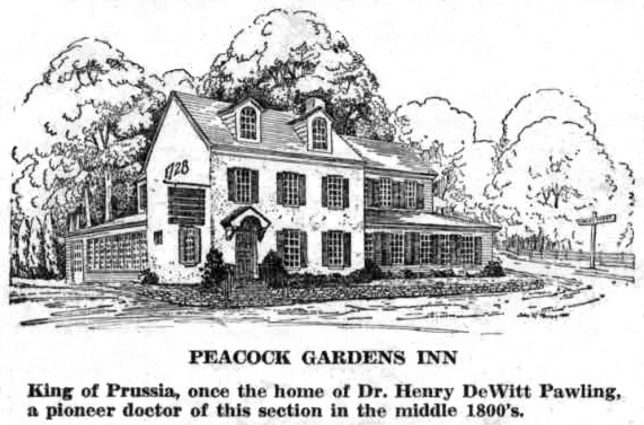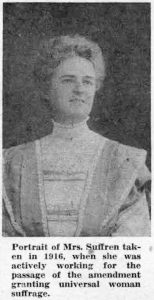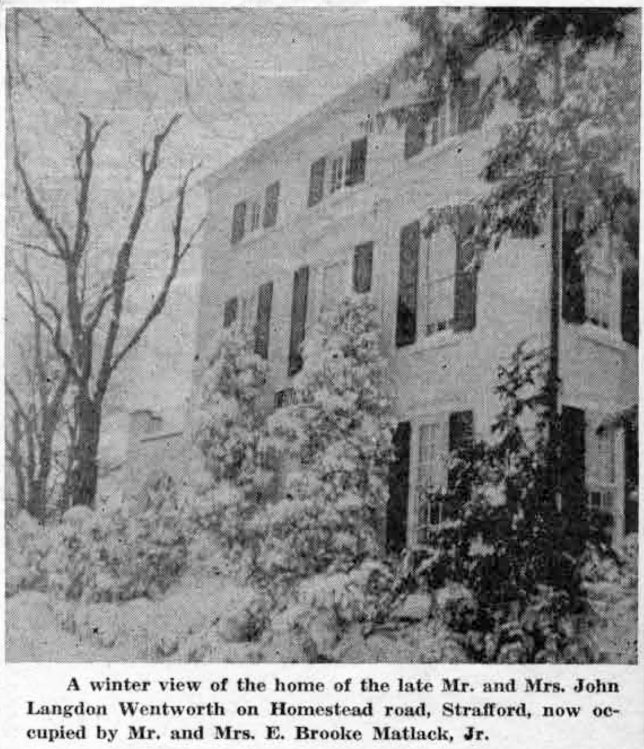 In the several interviews that the writer has had during the past few years with Mrs. Martha Suffren, “the grand old lady of Strafford” who has just celebrated her 97th birthday, the latter has recalled from memory many fascinating stories of her childhood in Strafford.
In the several interviews that the writer has had during the past few years with Mrs. Martha Suffren, “the grand old lady of Strafford” who has just celebrated her 97th birthday, the latter has recalled from memory many fascinating stories of her childhood in Strafford.
Today’s column is founded on Mrs. Suffren’s written recollection of one of the best known local physicians of his time, Dr. Henry DeWitt Pawling, who at the age of 26 took up his residence and established his practice at what is now known as “Peacock Gardens,” just across the road from historic King of Prussia Inn. The inn has figured prominently in the news of late, since its proximity to the new State Highway makes its preservation a matter of much uncertainty.
Dr, Pawling, “an old time doctor in Pennsylvania,” as Mrs. Suffren has described him, was born in 1810 and lived to the good old age of 82. His home and his office were both in what is now “Peacock Gardens.” The side door, “the one with an arched top,” Mrs. Suffren recalls as the door to his surgery.
The five years before he took up his practice were exciting ones, filled as they were with much adventure as assistant surgeon on the frigate “Potomac.” Of these years Mrs. Suffren writes:
“He was just 21 when the merchantman ship “Friendship,” gathering its cargo of pepper on the coast of Sumatra, was attacked by Malays who rifled the vessel, threw overboard the few sailors who were not busy on shore and made off with the ship. When the news reached Washington, the frigate “Potomac,” was lying in New York harbor. President Jackson ordered the ship to proceed to Sumatra to punish the piratical Malays. When young Pawling took his medical degree at the University of Pennsylvania he was listed as assistant surgeon on the frigate, where he served for the next four years. It was during the first part of this service that he was sent to Sumatra.
“A little silver plate, lying before me, was taken from one of a number of boxes made by members of the crew to hold young Pawling’s instruments. Dr. Drake has shown me one of these boxes. It is beautifully made with inlays of brass on the cover. The inscription on the plate reads: ‘Presented to Dr. Henry DeWitt Pawling, assistant surgeon, U.S. Navy, by “Potomac” as a testimonial of their esteem.”
Adventure for the young physician was past when, as Mrs. Suffren writes, “he settled down to the life of a country doctor. He chose his location at the crossroads of King of Prussia, but he had yet to win his spurs… to make himself known. He was then only 26. Frank Hughes, of Martin’s Dam, heard his father tell of seeing the young doctor called frantically out from among the congregation at the Port Kennedy church, as if the world were on fire. Another neighbor tells of seeing him ride curiously past her house on horseback, with a red and blue cape streaming out behind him. This she attributed to ‘advertising on his part’ and she told the story round about!
“Slowly, but surely, his practice grew until it covered a great part or the counties of Montgomery, Delaware and Chester. He never failed to respond to a call, whether from rich or poor. One Sunday morning, Dr. Drake, a younger physician looking at the immediate roads in the neighborhood of Dr. Pawling’s office, exclaimed that it looked as if a funeral were going on – all the four crossroads, for some distance away, were lined with buggies, surreys, dearborn wagons – every sort of conveyance, just so it was strong enough to carry its occupants to the old doctor’s office.
“There were always three fine horses ln Dr. Pawling’s stable. Often when the snow was drifted, he would have to plough through. Frequently, he would fall asleep in his buggy and trust to the horse to bring him home safely. One night, after 36 hours of work, dead weary, he was wakened from such a nap by a strange bumping. Opening his eyes, be found that he was travelling up the bed of the Valley Railroad, over ballast and ties. It was impossible to turn around, so he kept on until they met the next grade crossing… and all was well!
(To be continued)


